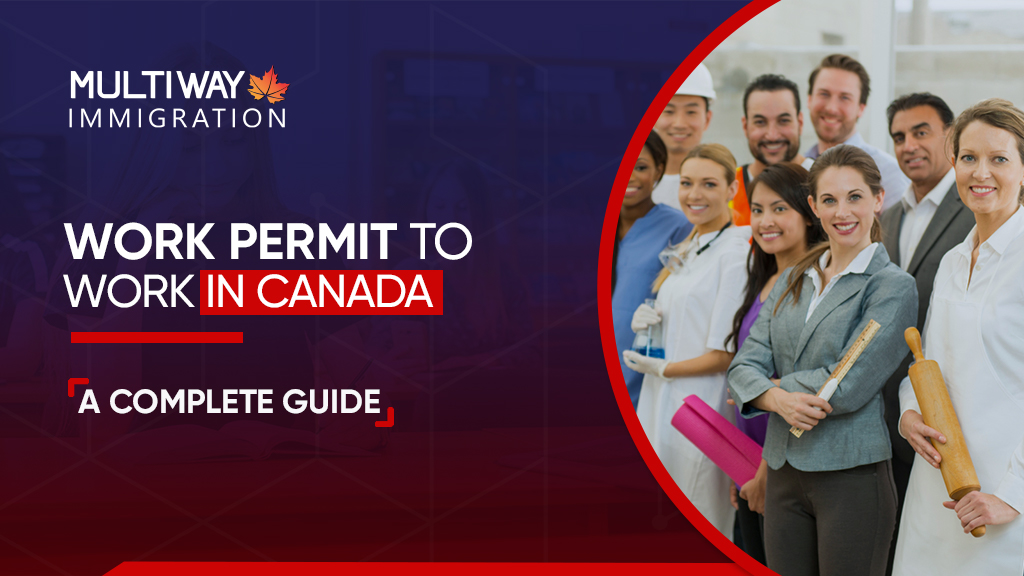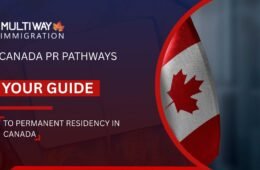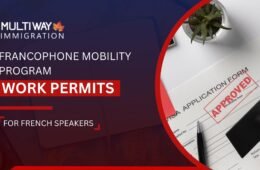
A work permit in Canada is like your golden ticket to work in the Great White North legally. It’s a document given by the Canadian government that says, “Hey, you’re allowed to work here for a certain amount of time.” Just remember, it’s not a one-time deal; you might have to renew it or head back to your home country when it expires.
In order to apply for a work visa in Canada, you’ll typically need to have a job offer or an employment contract from a Canadian employer. This employer must obtain an LMIA (Labour Market Impact Assessment) from ESDC (Employment and Social Development Canada). This assessment allows them to hire foreign workers for positions that Canadian citizens or permanent residents can’t fill.
Canada, as one of the world’s leading economies, is a prime destination for those looking to work abroad. A work permit to work in Canada offers opportunities to entrepreneurs, temporary workers, permanent workers, and students to work in Canada. Generally, applicants are required to secure a job offer before applying for this visa. This ensures that you have a specific employment opportunity waiting for you in Canada before you embark on your work journey there.
What is a Work Permit To Work In Canada?
A work permit (or work visa) in Canada is a document issued by the Canadian government that allows foreign nationals to work legally in Canada for a specific period of time, after which they need to either renew their work permit to work in Canada or return to their home country.
Issuing Authority
Work permits are issued by Immigration, Refugees and Citizenship Canada (IRCC), a government agency that helps newcomers settle in Canada.
Who Needs a Work Permit in Canada?
Foreign nationals who aren’t Canadian citizens and don’t have Canadian Permanent Residency usually need to obtain a work permit to work in Canada.
Exceptions
However, there are some exceptions:
- Temporary Business Visits: Workers who are not entering the Canadian labor market for business purposes.
- Students with Study Permits: Students holding a study permit can work up to 20 hours per week during the academic session without a separate work permit.
- Specific Workers: Workers like artists, performers, coaches, news reporters, and similar professionals who enter Canada for specific purposes without entering the Canadian labor market, provided they meet certain exemption criteria.
Offer Letter Contingency
When you send an offer letter to a new hire in Canada, it should include a clause about the offer being contingent on their eligibility to work in Canada legally.
Exploring Canadian Permanent Residency
If you’re considering a more permanent stay in Canada, you can explore options like Permanent Residency, Canada Express Entry, Canada Provincial Nominee Program, or Canada Family Sponsorship.
These pathways offer different routes to establish long-term residency in Canada. However, for immediate work opportunities, securing a work permit to work in Canada is the initial step to take.
Converting a Visitor Visa to a Work Permit in Canada
Step 1: Applying for a Visitor Visa (TRV)
Visitor Visa Basics
To begin the journey of converting a visitor visa into a work permit to work in Canada, the first step is to obtain a Canadian visitor visa, also known as a Temporary Resident Visa (TRV). This involves meeting specific requirements and understanding the associated fees and conditions.
1: Visitor Visa Fees and Requirements
Costs and Documentation
The application fee for a visitor visa is $100 CAD, with an additional biometrics charge of $85 CAD. Extending your visitor visa costs $100 CAD per person, and regaining your tourist status requires a fee of $200 CAD. Beyond the financial aspect, you must prove your intention to leave Canada after your visit, demonstrate sufficient funds to support yourself and any accompanying family members, maintain good health, and be willing to undergo a medical examination and a police verification if required.
2. Visitor Visa Processing Times
Processing Timelines
Typically, a TRV application takes 16-20 days to process, but recent application backlogs have extended the processing time to approximately 135 days. Ensuring that you provide all necessary documentation is crucial to avoid delays.
3. Application Process for a Visitor Visa
Steps to Follow
To secure a visitor visa, you can choose to apply online or in person. This involves completing a visa application form with essential information and documentation, making the necessary payment, and submitting your application, including biometrics, at a Canadian visa application center.
You will receive a receipt with a unique tracking number to monitor your application’s progress online.
Step 2: Obtaining a Job Offer and a Labour Market Impact Assessment (LMIA)
Crucial Steps after Arrival
Once you enter Canada on a visitor visa, you have limited time to apply for a job and obtain a positive LMIA. Finding a job offer can be challenging, making thorough preparation essential.
-
Research for the Job
The Job Search
Understanding the labor market opportunities in your destination and aligning your National Occupational Classification (NOC) code with in-demand jobs is a critical first step. You can apply for jobs online through various platforms, explore opportunities directly on employers’ websites, or seek assistance from friends and family.
-
Securing a Positive LMIA
LMIA Requirements
While researching jobs is crucial, it’s equally important to acknowledge that not all employers are willing to sponsor temporary visitors. To increase your chances of obtaining a work permit, exceptional skills, a strong network of contacts, or professional job search assistance can be invaluable.
-
Converting Visitor Visa to Work Permit in Canada
Transitioning with a Positive LMIA
Once you’ve secured a positive LMIA from a Canadian employer, you can apply for a work permit to work in Canada from within Canada. On February 28, 2023, IRCC announced that foreign nationals on a visitor visa with a valid job offer can apply for a work permit without leaving the country. This policy has been extended until February 28, 2025.
However, after this period, the process involves Flagpoling, where visitors briefly exit Canada through the US border to apply for and re-enter with a work permit.
-
Interim Authorization to Work
Immediate Employment
While waiting for your work permit approval, which can take around 132 days, you can’t legally work in Canada.
To address labor shortages, IRCC introduced “Interim Authorization to Work.” If you have an employer-specific job offer, you can receive this authorization quickly, allowing you to start working immediately.
Types of Work Permit To Work in Canada
Canada offers two primary types of work permits: employer-specific and open work permits. These permits differ in their scope and flexibility, catering to different situations and needs.
-
Employer-Specific Work Permits
An employer-specific work permit is a crucial document that enables you to work in Canada under specific conditions outlined in your work permit. These conditions include:
- Employer Information: Your work permit to work in Canada specifies the name of the specific employer for whom you are authorized to work. This means you are bound to work exclusively for this employer during the validity of your work permit.
- Duration of Work: The work permit clearly states the duration or period for which you are permitted to work in Canada. It is essential to adhere to this timeline to ensure compliance with Canadian immigration regulations.
- Location of Work (if applicable): In some cases, the location where you are permitted to work is specified in the work permit. It’s essential to follow these location restrictions if they are part of your work permit conditions.
Application Process for Employer-Specific Work Permit
Before applying for an employer-specific work permit, your employer plays a pivotal role in facilitating the process. They must provide you with:
- Employment Contract: Your employer should furnish you with a copy of your employment contract, detailing the terms and conditions of your employment in Canada. This document is crucial for your work permit application.
- Labour Market Impact Assessment (LMIA) or Offer of Employment Number (for LMIA-exempt workers): Depending on your circumstances, your employer needs to provide either a copy of a positive LMIA or an offer of employment number if your position falls under LMIA-exempt categories. To obtain the offer of employment number, your employer typically uses the Employer Portal.
Note: If your employer is not required to use the Employer Portal, they must provide you with a copy of the employment contract as part of the application process.
-
Open Work Permits
An open work permit is a highly flexible option that grants you the freedom to work for any employer in Canada, with some exceptions. It’s important to note that you cannot work for employers who are either listed as ineligible due to non-compliance with conditions or engage in specific services like striptease, erotic dance, escort services, or erotic massages.
Eligibility for Open Work Permit
While open work permits offer versatility, they are typically issued in specific situations. Here are some key points to consider:
- Medical Examinations: Some job positions may require a medical examination. If you wish to avoid having medical conditions on your open work permit, you have the option to undergo a medical exam conducted by a panel physician recognized by Canadian authorities.
- Specific Situations: Open work permits are typically issued in specific situations, such as for certain spouses or partners of study permit holders, temporary residents awaiting the finalization of their permanent residence application, and individuals participating in specific programs.
-
Canadian Work Permit Programs
Canada administers work permits under two main programs: the Temporary Foreign Worker Program and the International Mobility Program. These programs serve distinct purposes and align with Canada’s economic, social, and cultural interests.
-
Temporary Foreign Worker Program
This program addresses labor market shortages by facilitating the entry of skilled foreign workers into Canada. Employers seeking to hire foreign talent under this program often require a Labor Market Impact Assessment (LMIA) to demonstrate the need for foreign workers.
-
International Mobility Program
The International Mobility Program aims to strengthen Canada’s global ties and promote cultural exchange. It allows certain categories of foreign nationals, such as those in arts, culture, sports, and religion, to live and work in Canada.
Work Permits: Paving the Path to Express Entry and Beyond
While the Express Entry stands as a prominent route to achieving permanent residency in Canada, it may not always align with everyone’s circumstances or preferences. For those who initially don’t meet the Express Entry criteria or wish to explore Canadian opportunities before committing to long-term residency, work permits offer a valuable alternative.
Exploring the Synergy: Work Permits and Express Entry
- Canadian Experience: Canadian work experience holds substantial weight in the eyes of immigration officials. Time spent working in Canada under a work permit can significantly boost your Express Entry Comprehensive Ranking System (CRS) score. This enhanced score increases your chances of receiving an invitation to apply for permanent residency.
- Networking Opportunities: Working in Canada provides a platform to connect with potential employers and industry professionals. This networking can be instrumental in securing a job offer.
- Testing the Waters: Temporary employment in Canada allows individuals and families to assess whether Canada aligns with their aspirations and lifestyle before committing to permanent residency. It serves as a practical and prudent approach to ensure that Canada is the right fit for you.
Beyond Work Permits: Canadian Immigration Landscape
In addition to work permits, the Canadian immigration landscape offers several avenues for individuals and families to pursue their dreams of living in this diverse and welcoming country.
- Study Permits: For those seeking educational opportunities, Canada study permits provide access to world-class institutions while paving the way for potential work and immigration options.
- Express Entry: It is a streamlined and efficient pathway to permanent residency for skilled workers. By creating Express Entry profiles, individuals can present their qualifications and enhance their chances of receiving an invitation to apply.
- Provincial Nominee Programs for Business (PNPs): PNPs offer unique routes for business professionals and skilled workers to obtain provincial nominations, leading to permanent residency. These programs cater to specific provincial needs and priorities.
- Family Sponsorship: Canadian citizens and permanent residents can sponsor eligible family members to join them in Canada, reuniting loved ones and strengthening familial bonds.
- Work Permit Applications: Beyond temporary Canada work permits, Canada also offers pathways for individuals with specialized skills and qualifications to obtain work permits through specific programs and categories.
Seeking Guidance and Expertise
Navigating the Canadian immigration landscape can be intricate and nuanced. Seeking the assistance of an experienced Canada immigration consultant, such as those in Edmonton, can prove invaluable. These professionals can provide guidance on Provincial Nominee Programs, family sponsorship, and Canada work permit applications, ensuring that your journey towards Canadian residency is well-informed and successful.
Conclusion
In the pursuit of one’s dreams and aspirations, the journey through Canada’s immigration landscape can be both exciting and complex. Whether you are exploring opportunities through the Express Entry system, Nominee Programs, family sponsorship applications, or work permit applications, having the right guidance is paramount.
This is where trusted immigration services come into play. A Canada immigration agency or immigration consultant in Edmonton can serve as your compass in this intricate journey.
With their expertise and in-depth knowledge of Canadian immigration policies, they offer invaluable insights and support, ensuring that your path to Canadian residency is well-informed and successful.
In a landscape that demands precision and compliance with ever-evolving regulations, relying on immigration services becomes not just a choice but a strategic decision.
These professionals understand the nuances of the Canadian immigration system, enabling you to navigate it with confidence and clarity.
FAQs
- What is a work permit in Canada?
A work permit in Canada is an official document issued by the Canadian government that allows foreign nationals to work legally within the country for a specified period. It is a critical requirement for individuals who are not Canadian citizens or permanent residents but wish to work in Canada.
- What are the main types of work permits in Canada?
There are two primary types of work permits in Canada:
Employer-Specific Work Permit: This permit restricts the holder to work for a specific Canadian employer, with conditions related to the employer’s name, work duration, and work location.
Open Work Permit: An open work permit offers more flexibility, allowing foreign nationals to work for any Canadian employer except those listed as ineligible. It is not tied to a specific employer.
- How can I obtain an employer-specific work permit in Canada?
To obtain an employer-specific work permit, you will typically need an employment contract from a Canadian employer and, in many cases, a Labour Market Impact Assessment (LMIA) or an offer of employment number if you are LMIA-exempt. Your employer plays a crucial role in this process.
- What are the eligibility criteria for a work permit in Canada?
While eligibility criteria can vary depending on the type of work permit, some common requirements include proving your intention to leave Canada at the end of your work permit, having sufficient financial resources, a clean criminal record, good health (sometimes requiring a medical exam), and compliance with specific conditions set by the government.
- What is the Entry system in Canada?
Express Entry is a points-based immigration system used by the Canadian government to manage and select candidates for immigration to Canada based on their qualifications, work experience, and other factors. It is a pathway to permanent residency for skilled workers and professionals.





